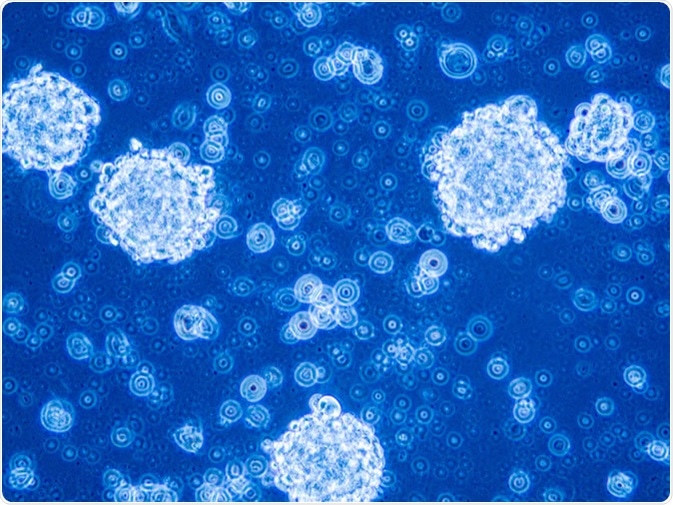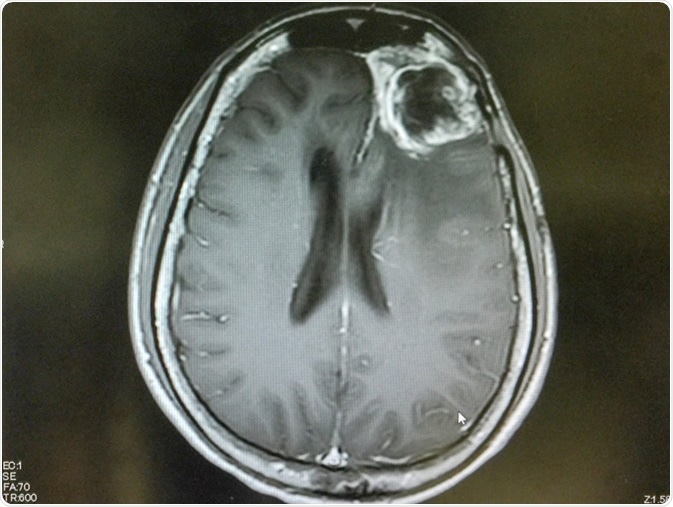Scientists at the University of Sussex could be a step closer to developing the first-ever blood test to diagnose the most aggressive type of brain cancer, glioblastoma.
The team of researchers, working at Professor Georgios Giamas’ laboratory, has found novel biomarkers in the body fluids that could hint the presence of the tumor.
Biomarkers are biological molecules found in blood and other body fluids that could signal a normal or abnormal process, including the presence of a disease. Cancer biomarkers provide a signal of the presence of cancer cells, which are considered biological signatures of disease.
In the study published in the journal Nature Communications Biology, the researchers report that specific biomarkers linked to extracellular vesicles, which are tiny packages released by cells into body fluids so they can communicate with each other.
Extracellular vesicles (EVs) is a way through which tumor cells, which include cancer stem cells, self-regulate, and communicate with their stromal counterparts. This way, they maintain such high-tumoral heterogeneity.

Glioblastoma stem cells organized in tumor niche formation. Image Credit: Anna Durinikova / Shutterstock
The deadly glioblastoma
All brain cancers are complex, but glioblastoma is very aggressive because of how fast it kills its victims. Usually, patients with this type of brain tumor die within just months. The tumor stems from the brain or spinal cord, and the symptoms include weakness, fatigue, lack of coordination, vomiting, nausea, blurred vision, headaches, and seizures.
Glioblastoma multiforme (GBM), otherwise called glioblastoma, is a fast-growing and aggressive glioma that forms from the glial cells, which helps support nerve cell health. The tumor is very aggressive that it grows rapidly, usually spreading into nearby brain tissue.
The disease is very devastating, often resulting in death in the first 15 months after being diagnosed. In the United States, about 22,850 adults were diagnosed with brain and other types of cancer affecting the nervous system in 2015.
GBM, however, has affected two to three per 100,000 adults per year, accounting for 52 percent of all primary brain tumors. Also, GBM accounts for an estimated 17 percent of all tumors in the brain, both metastatic and primary types.
Blood test simpler than biopsy
The researchers believe that the discovery could lead to a simpler way to test for the presence of brain tumor cells, than the traditional biopsy, which is invasive and painful. Testing body fluids like the blood could be a less invasive and cheaper means to test for glioblastoma, plus, it will not take a long time to get the results.
“At the moment, the outlook for glioblastoma patients is bleak. As the most aggressive type of brain tumour, the survival rate is low,” Georgios Giamas, Professor of Cancer Cell Signalling in the School of Life Sciences, said.

MRI brain show left frontal gliblastoma. Image Credit: O_Akira / Shutterstock
"Our research provides more information about the markers which can signal the presence of glioblastoma - and the fact we've been able to identify ones that are associated with extracellular vesicles, suggests that there could be a way to use bodily fluids to test for the tumor in future,” he added.
At present, many studies are focusing on looking into the possibility of developing liquid-biopsies such as blood tests to spot not only brain cancer but also other types of cancer, like pancreatic. Instead of getting a sample of tissue from the affected area, liquid biopsies would let doctors get a blood sample and detect biomarkers to diagnose the presence of tumors.
"Liquid biopsies mean a less invasive procedure for patients, and arguably quicker results - something which is invaluable for those with an aggressive tumor that severely cuts life expectancy,” Dr. Thomas Simon, study co-author, said in a statement.
"But it could also mean better patient follow-up care, as a simple test can be carried out to check for the efficacy of existing treatments or monitoring relapse. The more we know about biomarkers, the better, so this is a step which should provide hope for anyone whose lives have been impacted by glioblastoma,” he added.
The next step for the team is to validate the presence of the newly-identified biomarkers for the three sub-types of glioblastoma.
“Overall, these data could assist future GBM in vitro studies and provide insights for the development of new diagnostic and therapeutic methods as well as personalized treatment strategies,” the researchers wrote in their paper.
Journal reference:
Cell-derived extracellular vesicles can be used as a biomarker reservoir for glioblastoma tumor subtyping Rosemary Lane, Thomas Simon, Marian Vintu, Benjamin Solkin, Barbara Koch, Nicolas Stewart, Graeme Benstead-Hume, Frances M. G. Pearl, Giles Critchley, Justin Stebbing & Georgios Giamas, Communications Biology volume 2, Article number: 315 (2019), https://www.nature.com/articles/s42003-019-0560-x